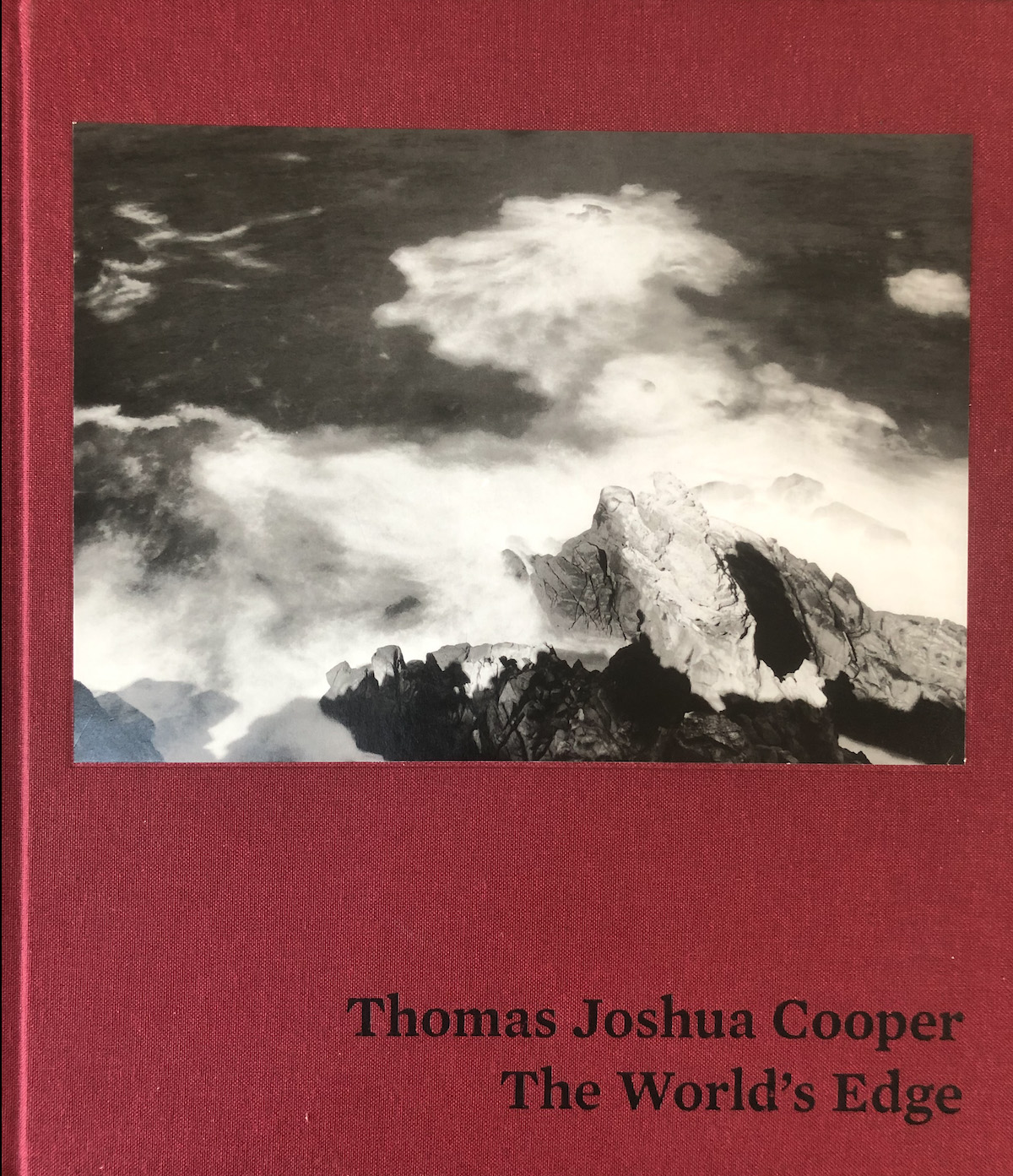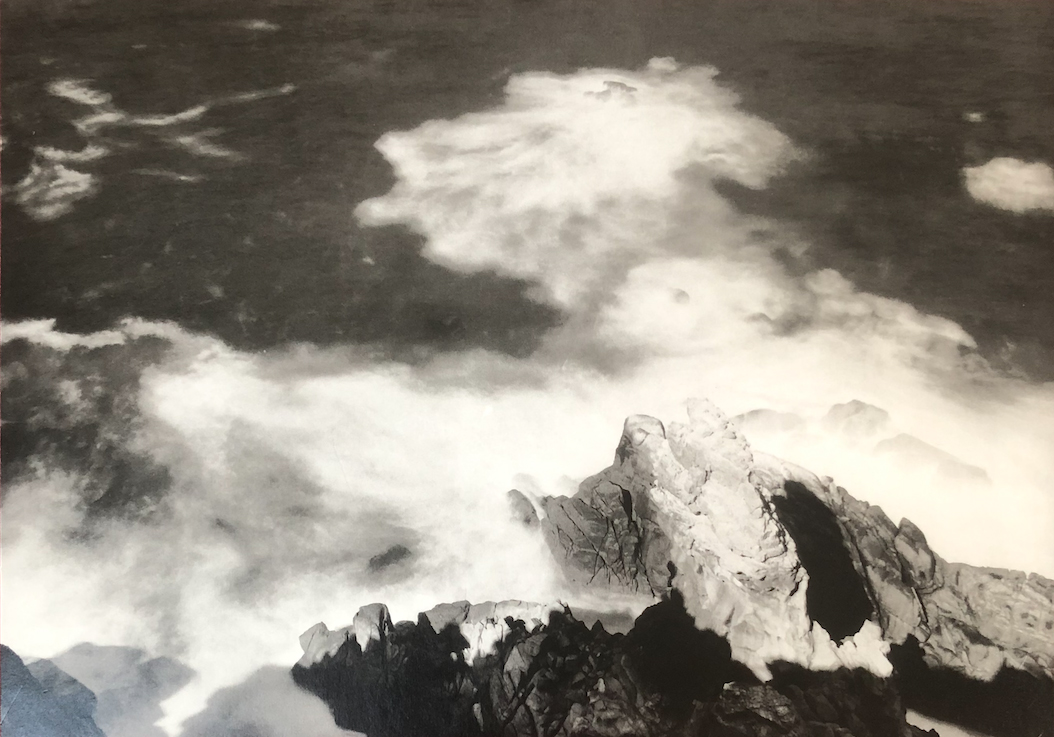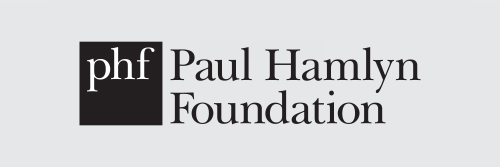

Thomas Joshua Cooper – a personal reflection By Tony Cearns
It has always seemed to me that a photograph (and perception) is never just of a something. It is of ‘a something’ as a certain type of thing. Cooper’s photographs remind me of this insight.
Perception takes whatever it perceives as a certain type of thing, an intuition for want of a better term. From intuitions arise percepts and concepts bringing into play memory, mood and so on, all articulated in language. When we see something we are already predisposed into thinking about it in a type of way. Things are not simply given to us – we construct our perceptions guided by features and relations in the things we see. Photographers play with how such features and relations project out to us. Or so I hold.
Cooper’s studies are given to musings about intuition. Cooper’s Basin Project 1 is such a study. It is perhaps the culmination of his long and persistent preoccupation with making pictures of places remote and untamed. I say ‘perhaps’ because one might imagine that a final reckoning with the edges of the world is one that recedes the harder you push to confront it. Does not the very idea of an edge presuppose something siren-like beckoning from beyond? Isn’t one person’s finisterre another person’s point of departure? For Cooper I suspect the answer is yes.
The pictures, some drawn from previous publications, span the edges of continents that surround the Atlantic Basin: North America, South America, Antarctica, Africa, Europe and the Arctic. They are partly cartographic and partly expeditionary. Although Cooper made his pictures ‘at the ends of the earth’, they could equally have been taken at the bottom of his garden, for his ‘ends of the earth’ are located in an interior space. They are also metaphorical. I baulk at calling them transcendental as many have done 2.
What do I mean by ‘metaphorical’? What metaphor uses, as the philosopher Donald Davidson reminds us, is no different to the semantic resources on which ordinary language depends. Contrary to much opinion, photographic metaphors need not be ‘visual’ as in visible signs that point elsewhere ‘transcendentally’. We do not need to decode or use look-up tables to understand what thoughts we entertain when we look at something. The metaphor is a conceptual process of understanding one thing in terms of a different thing. It is based on a condition of inwardness, ‘the inside’, from which its structure derives. It comes from a creative process that continuously revisits its starting point: an intuition. It is an immanent process not a transcendental one 3.
Cooper’s compositional techniques and his unwillingness to show horizons blur the lines between nature and abstraction thereby emphasising the importance of the condition of inwardness and metaphor. He forces you to gaze rather than glance, see rather than look.
This much I get from Thomas Joshua Cooper.
But there is something else too. It has to do with the nature of process and thing. Cooper references Yi fu Tuan in his PhD.
Yi fu Tuan talks about the existential dialectics that propel people between a pole of experience characterized by rootedness, security and grounding, on the one hand, and a pole characterized by outreach, potentiality and expansiveness, on the other hand. These opposites interact: there is a certain distance in what is nearby and a certain nearness in what is far away. Therefore, ambivalence is the norm when it comes to the human experience of dwelling in the world with its existential pulls between space and place, mobility and stasis, the distant view and embodied engagement.
It is interesting that Cooper should reference Yi fu Tuan. But I think there is a more fundamental dichotomy at work which Cooper’s work shows me too. It has to do with our relationship to things as in objects. Rocks, sand, water and so on.
It is hard to focus on any objects in his pictures. This is because they form part of a process of energy in which relationships of objects and light are subjugated to the movement itself. One can almost feel the energy of the waves and, by proxy, the wind. Objects are just the visible manifestations of a process at a particular point in time. Objects are crystallised processes, as Alfred North Whitehead was at pains to point out.
The dichotomy arises because we are used to thinking about inanimate objects as if they are solid fixtures. So we fail to see, or forget, that our relationships to objects are continually changing and that it is objects that individuate what we see and think. Bruno Latour talks about the ‘dark matter’ of things by which he means that things exist ‘below the radar’ (my phrase). Our relationships to things have a taken-for-granted quality. But isn’t this the kind of relationship which some of us photographers are trying to get away from?
So the thing that I get from Cooper concerns our relationship to things. There are no pure things, no pure processes. No pure nature, no pure culture. All is ceaseless change. Nothing is reducible to anything else. All is immanent and multivalent.
Of course, that’s a lot to get from a few pictures! But that’s where they seem to lead me when I gaze at his pictures in the quiet.
Photo credit: Late-Afternoon Storm Silence – Picinguaba Bay and the South Atlantic Ocean, Brazil 2006 © Thomas Joshua Cooper
1. ‘The World’s Edge – The Atlantic Basin Project – The Atlas of Emptiness and Extremity’ edited by Michael Govan and Rebecca Morse, Los Angeles County Museum of Art, Delmonico Books, 2109
2. For example Gerry Badger sums Cooper up: ‘Cooper’s photographs are essentially “path” photographs’ that device that ‘draw(s) the viewer into the picture space’. (‘The Pleasures of Good Photographs’, essays by Gerry Badger, Aperture 2010 p. 154). Later in the same essay: ‘(Cooper) almost single-handedly has proved that there is life, and relevance, in the transcendental photographic tradition of Alfred Stieglitz and Minor White – and indeed, has taken it to a new level’. (3. Badger, ibid p.156). We see this categorisation in Paul Hill’s essay too in a section called ‘Metaphor and Transcendentalism’(http://www.hillonphotography.co.uk/writings/modernism_and_the_landscape.php accessed 6th June 2020.)
3. I’m not sure anything said to be ‘transcendental’ holds much meaning for me. For a fascinating discussion on this see ‘The Evolution of Modern Metaphysics: making sense of things’, A. W. Moore, Cambridge University Press, 2012
Tony Cearns is a photographer and darkroom printer. He makes pictures for the sheer joy of it. He is shortly embarking on a PhD in Philosophy at the University of Liverpool. His website can be found at

